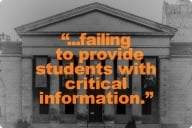You have /5 articles left.
Sign up for a free account or log in.
WASHINGTON -- The Consumer Financial Protection Bureau announced Thursday that it was beginning an inquiry into the arrangements between colleges, banks and debit card companies. The announcement is the latest indication that federal agencies and Congress are taking an increased interest in how debit cards are used to access federal financial aid.
The bureau is asking for input on a few separate topics: debit cards supplied by companies like Higher One, which give students the money left over from grants and loans after paying tuition; arrangements between colleges and banks that allow student identification cards to be used as debit cards; and college-affiliated bank accounts.
College business officers say those products are quite different from one another. Preloaded debit cards have caught on in recent years as a method of giving college students access to federal grants and loans for living expenses. While they have come under scrutiny for high fees, they are a way to give money to students without using paper checks, and do not require a bank account. Critics say students would be better off opening a bank account than relying on preloaded cards.
Higher One has dominated the debit card market for years, and has come in for much of the criticism for swipe fees, ATM fees and other charges that can chip away at students’ financial aid. As the cards have grown more popular, other banks, including Sallie Mae, have entered the market place.
Agreements between colleges and banks are more common at larger universities, unlike the debit cards, which are more popular at community colleges, said Anne Gross, vice president for regulatory affairs at the National Association of College and University Business Officers. Under the agreements, banks offer benefits to colleges, such as additional scholarship money. In exchange, the colleges offer students the option of using their ID cards as a debit card, encouraging them to use that bank for their checking accounts.
The consumer protection agency appears concerned that those arrangements can stop students from shopping around for bank accounts that might offer a better deal. Past investigations, including one by New York Attorney General (now Governor) Andrew Cuomo in 2007, found that "preferred lender" arrangements between colleges and student lenders (until the conversion away from bank-based lending in 2010) sometimes led to deals that included benefits for colleges but weren't the best option for students.
They are also concerned about the fees students can incur on preloaded debit cards. While the Credit Card Act of 2009 restricted how credit card companies can market on campus -- they can no longer offer gifts or other incentives to students for opening credit cards, for example, and colleges must disclose their relationships with credit card companies -- the debit card market is murkier, officials from the consumer protection agency said.
“We have a better sense of how those markets work, but less is known about other financial products that are marketed to students through schools,” said Rohit Chopra, the bureau’s student loan ombudsman, who is also overseeing the debit card inquiry.
The consumer protection bureau has been increasingly active in looking at student lending and loan servicing issues, but this is its first foray into other campus territory. In asking for information about student experiences with, and complaints about, banking products, the inquiry resembles one the bureau made into private student loans last year. It also asks how the arrangements are being marketed to students and what fees, if any, they can incur.
The inquiry is the latest harbinger of increased interest from the federal government in debit cards on campus. Representative George Miller, the ranking Democratic member of the House Committee on Education and the Workforce, recently sent a letter to Higher One asking about its ATM and fee policies.
“I am deeply concerned students using debit cards will have difficulty accessing their funds free of fees,” Miller wrote. In response, a Higher One spokeswoman said that the company complied with Education Department regulations on ATMs, but the company did not provide the list of ATMs that Miller requested.
On Thursday, Miller issued a statement calling for more fee-free ATMs for students on campus.
The Education Department is also reportedly soon announcing negotiated rule making on financial aid fraud, including how financial aid debit cards can abet or prevent it.
NACUBO, the college business officers’ association, recently released best practices for preloaded debit cards, including encouraging students to use banks instead; using a competitive bidding process; and negotiating lower fees or no fees at all.
The association would be wary of additional regulation, in part because the debit card market is still new and changing frequently, Gross said. “There’s a lot of movement in this space, and regulation tends not to change with the times very well,” she said.
One result of the inquiry might be better guidance for colleges on negotiating with banks, Chopra said. “We do hear from students that they’re often surprised by the terms and conditions of these products, and then there’s other students who find the school-endorsed product is a huge convenience,” he said.







